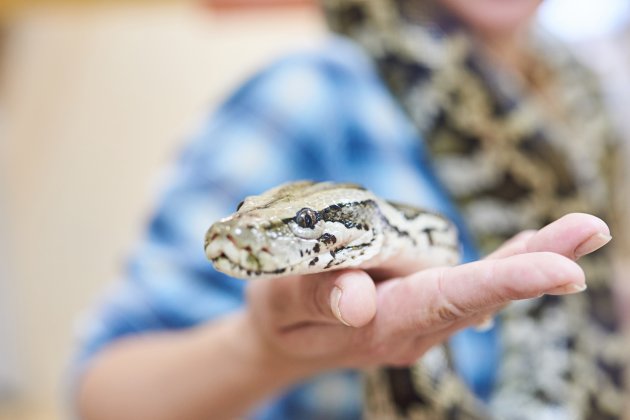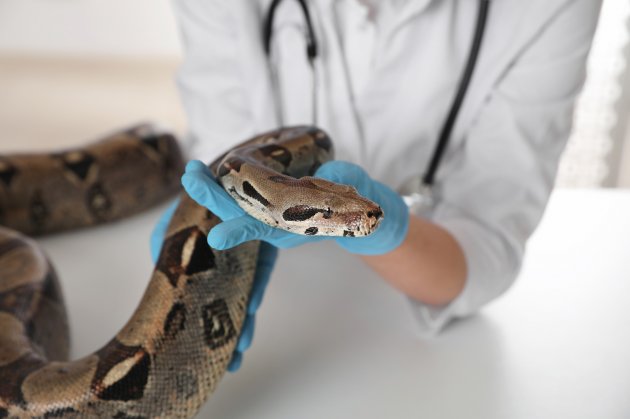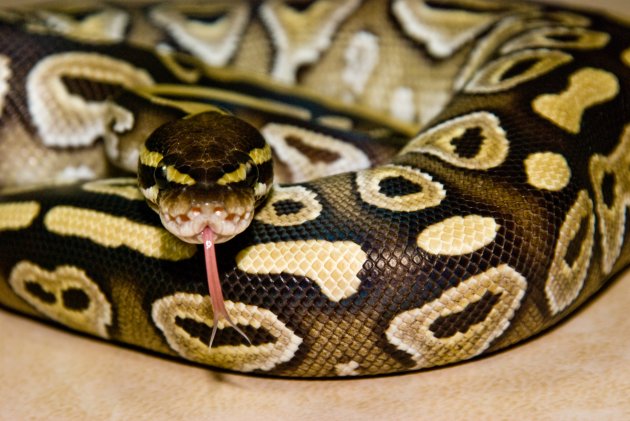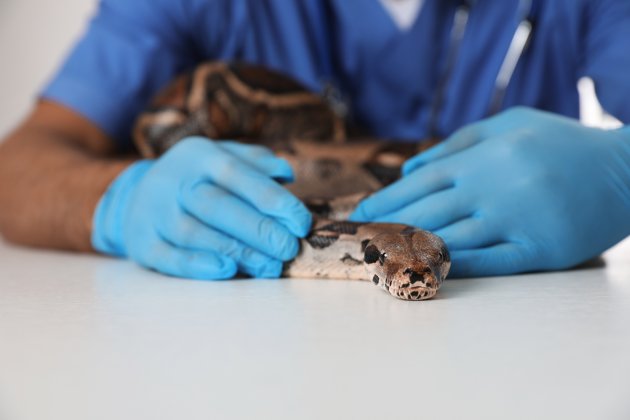Ball Pythons are very common snakes kept by many reptile owners. These are very docile animals and very hearty animals. This makes them a great first snake for many people. While they are usually a very healthy animal, they can have some health problems. These are some of the main health problems seen in Ball Pythons and what you can do to help your snake.
Inclusion Body Disease
Inclusion Body Disease is usually a fatal viral disease seen in ball pythons. Usually, this affects the nervous system of most snakes but can also affect other systems. The most common signs seen with IBD are:
- Head tremors,
- Different size pupils,
- Muscle spasms,
- Head arching backward (Stargazing),
- Vomiting,
- Loss of appetite,
- Swollen mouth,
- Poor body condition,
- Skin disease,
- Difficulty breathing,
- Lethargy and decreased mental activity,
- Impaired righting reflex (the ability to orient the body back to an upright position),
- Decreased muscle tone,
- Constipation
While this is a long list of signs often seen with IBD, these signs could also mean that your ball python has something else going wrong with them. If you notice any of these signs in your ball python, take them to your veterinarian. They can run a blood test to see if your snake does have an inclusion body disease.

While there is no real treatment for this disease, your snake may receive supportive care until testing confirms they have IBD. If your snake does have IBD, they should be humanely euthanized, as this is a highly contagious and fatal disease.
Since this disease is very contagious, when you acquire a new ball python, it should be placed in a different enclosure than all your other snakes for a few months to make sure that they do not show signs of any disease. Also, they can have a blood test ran to make sure they do not have IBD.
Respiratory infections
Snakes can commonly get upper respiratory infections, especially if there is something wrong in their cage. Most of the time, ball pythons with respiratory infections will also have mouth rot. Mouth rot is an infection in the mouth of snakes, usually around the jaw and teeth. Common signs in ball pythons with respiratory infections are:
- Lethargy,
- Loss of appetite,
- Mucus in their mouths,
- Nasal discharge,
- Open mouth breathing,
- Wheezing,
- Making a 'gurgling' sound
If you notice any of these signs, take your snake to your veterinarian as most of the time, this infection is caused by a bacterium. Your veterinarian will prescribe your snake antibiotics. Usually, after a few days of antibiotics, your snake will be feeling much better.

Thermal Burns
Most snakes have some type of heat source in their cage. This may be a light hanging over the cage, a heating pad under the cage, and sometimes even a heat rock that stays in the cage. When a snake gets sick, they will not be as active and may get burned from sleeping in the same spot for too long. This would be very similar to sunburn in people. You would see many of the same signs in your snake as you would expect from someone with sunburn such as:
- Scale loss,
- Raw spots on the body,
- Blisters
If you notice any of these problems in your snake, take them to your veterinarian for an examination. Your veterinarian may prescribe your snake a cleaner to clean the area a few times a day and some cream to apply after cleaning. This will help these areas heal quickly. If there is a secondary infection that has already set in, your ball python may also need antibiotics to help clear up the infection.
Shedding problems
Snakes will occasionally shed as they grow. This will be more often when they are young and growing. When your snake sheds, they may also have problems fully shedding; this is known as dysecdysis. Most snakes will shed in one piece, but snakes who are sick or whose habitat is not at perfect temperatures will have trouble shedding. Common signs seen in Ball Pythons with shedding problems are:
- dull scale coloration,
- opaque blue eyes,
- lethargy,
- loss of appetite,
- defensive behavior,
- wrinkled skin
If you are having problems with your snake shedding, check the temperature and humidity of your ball python’s cage. Change the temperature and humidity until your snake’s habitat is back to normal. Also, you can give a warm shallow bath for your snake to get into to help them shed. Watch your snake in the water to make sure that they do not drown.

If you still cannot get the leftover shed off, take your snake to your veterinarian as they can help you get the rest of the shed off your snake. You should never just pull the extra shed on your own.
Prey Bites
If your ball python is sick and you are feeding them live animals, they may become the prey. Many mice will bite a snake if they are not eaten quickly enough. When feeding live prey, make sure to watch your snake to make sure that they are eating their prey. If your ball python does become a victim to their prey, take the prey out of their cage and feed them killed prey until they start to eat readily.
Many prey bites will need to be treated with a topical cream to keep an infection from happening. Your veterinarian can examine your ball python and prescribe medication to help with their bites.

Conclusion
While Ball pythons are great snakes to own for first-time snake owners, they can have a few medical conditions that you should always be on the look at for. Many times, with ball pythons, you need to monitor them very often, and as soon as you notice any signs of problems, seek veterinary care as soon as possible. Ball pythons will not show signs of illness sometimes until it is too late to do anything to fix the problem. Ball Pythons can be a very good pet and even a stepping stone to a more complex snake.
Further reading and references:
- Youth Development through Veterinary Science 11: Is Your Snake Sick?
- Differential Disease Susceptibilities in Experimentally Reptarenavirus-Infected Boa Constrictors and Ball Pythons
- US National Library of Medicine. National Institutes of Health. Ball Python Nidovirus: a Candidate Etiologic Agent for Severe Respiratory Disease in Python regius